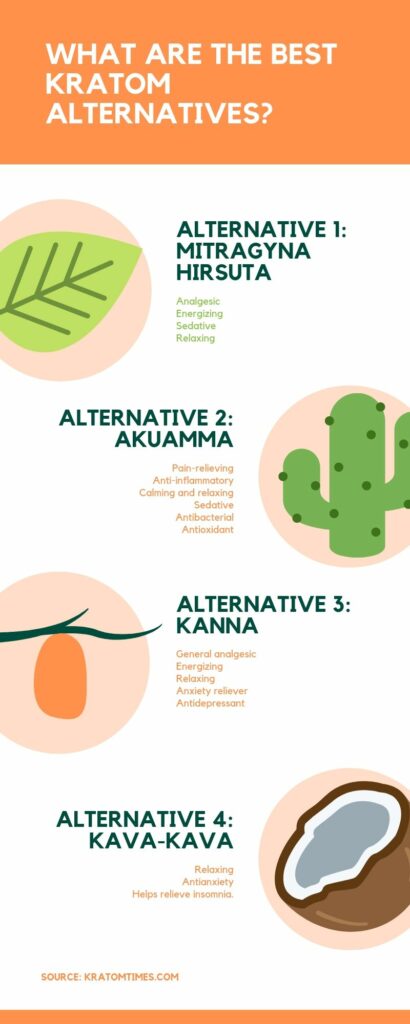Kratom, a popular herb from South East Asia, is currently used in the US by many individuals looking for natural alternatives to alleviate a number of illnesses and conditions. But although currently, people’s access to kratom is widespread in most areas of the US, there are states and cities where this is not possible.
On the other hand, we’ve learned that Indonesia, which is kratom’s main exporter, has recently prohibited kratom growing and exportation. As such, the Indonesian Government has given kratom grower a 5-year period to comply with the legislation. After that, the kratom ban will be fully in place. Hence, many people are worried that they will no longer have easy access to kratom in the future.
But, are there any alternatives to kratom which can be equally effective? If so, what are the best kratom alternatives? Keep reading below to discover some of them.
What Are Kratom’s Main Properties?
To understand what the best kratom alternatives are, first, you should know the main’s kratom properties. Mitragyna speciosa (or kratom) has different properties depending on the dosage and the varieties. This makes it a very versatile herb to use for a number of conditions.
Kratom’s main properties are:
- Pain relieving and analgesic: it is used by people suffering from chronic pain conditions.
- Calming and relaxing: it can help ease anxiety and achieve better sleep.
- Stimulating and energizing: in small dosages, it produces a sense of stimulation and increases energy levels.
- Euphoric and mood-enhancing: it can improve your mood and ease social anxiety situations.
Additionally, the plant is used by people who want a natural alternative to opioids or look to come off them completely. This is due to the plant’s action on the opioid receptors of the brain. The plant contains alkaloids that bind to those opioid receptors without the unpleasant and dangerous effects of opioids.
Reasons to Use Kratom Alternatives
If you are a kratom user and it works for you, you may wonder why you should use kratom alternatives. If kratom is working well for you, there is no need to use an alternative, but there are instances where it can be a good idea to look for one, including:
- Kratom is illegal or not available where you live
- To avoid developing kratom tolerance
- To avoid developing a kratom addiction
On the other hand, maybe you just want to try something different to be prepared in the event that kratom is no longer available in the US in the future.

What Are the Best Kratom Alternatives?
Since kratom is a very versatile herb that can be used for multiple purposes, it is not easy to find a substitute that has all its properties. However, there are some products in the market that have similar effects. So, what are the best kratom alternatives? Let’s see them below.
Mitragyna Hirsuta
As its name reveals, Mitragyna hirsuta is a close relative to kratom (Mitragyna speciosa), and, like kratom, it belongs to the same family as coffee. The plant also grows in Asia, especially in Cambodia and Vietnam.
Mitragyna hirsuta owes its properties to an alkaloid called mitraphylline, which is similar in chemistry to kratom’s main alkaloids. Thanks to it, the plant has the following properties and effects:
- Analgesic
- Energizing
- Sedative
- Relaxing
Additionally, like kratom, it can help relieve symptoms associated with opiate withdrawal. However, consider that the plant’s effects are milder to those of kratom.
Akuamma Seeds
The seeds of the Akuamma tree have been traditionally used in countries of Western Africa for centuries. The plant owes its properties to akuammine and akuammidine, its primary alkaloids. Akuammine is very similar to mitragynine, which is kratom’s main alkaloid. Moreover, these alkaloids act as an opioid agonist on your brain, this means that they block opioid receptors of the brain, which helps ease the pain.
The main properties of akuamma seeds are:
- Pain-relieving
- Anti-inflammatory
- Calming and relaxing
- Sedative
- Antibacterial
- Antioxidant
However, if you want to ease the symptoms of opiate withdrawal, akuamma might not be as effective as kratom.
Kanna
Kanna is a succulent plant from South Africa, which is similar to cactus. The plant contains various alkaloids, including mesembrine, which gives the plant its relaxing properties. Thanks to its ingredients, kanna has similar effects to SSRI medications. For this reason, you should avoid mixing it with these types of medications, as this can increase the development of serotonin syndrome.
Kanna’s primary effects include:
- General analgesic
- Energizing
- Relaxing
- Anxiety reliever
- Antidepressant
Like kratom, kanna’s effects depend on the dosage. It is more energizing and euphoric at smaller doses, whilst more relaxing at higher ones.
Kava
Kava is probably the most popular plant of this set. Although it is not properly a kratom alternative, they share some common properties, including:
- Relaxing
- Antianxiety
- Helps relieve insomnia
The best thing about kava is that is widely available, and there are even kava bars in some states of the US. So, if you are using kratom to relax and relieve anxiety, this is probably a great alternative.

Where to Buy Kratom Alternatives
Contrary to kratom, the above herbs are not as popular, so they may seem difficult to find in the market. Only kava (or kava kava) has the same popularity as kratom or even more. So, will it be hard to purchase these kratom alternatives? The answer is no.
The good news is that most kratom vendors also offer kratom alternatives. So, if you are a kratom user, simply go to your favorite supplier and take a look at their products, you’ll probably be amazed at the variety most of them offer.
Finally remember that if you are thinking of using a kratom alternative, it is strongly recommended that you do your own diligence and investigate thoroughly. Also, you shouldn’t mix it with kratom or any other medication. And, if you can, ask your practitioner before using any herbs, especially if you are using other prescription or over-the-counter medicines.


